- Home
- Helen Forrester
Twopence to Cross the Mersey Page 7
Twopence to Cross the Mersey Read online
Page 7
‘I know where we’ll go,’ I said to Avril, who was bouncing up and down in the Chariot pretending it was a horse.
‘Where?’
‘We’ll go down to the Pier Head!’
I knew this part of the town, because I had been shopping in it on many occasions with my grandmother. I pushed the Chariot purposefully up Lord Street to the top of the hill, where Queen Victoria in pigeon-dropped grey stone presided, down the hill, through a district of shipping offices with noble names upon their doors: Cunard, White Star, Union Castle, Pacific & Orient, the fine strands which tied Liverpool to the whole world. Past the end of the Goree Piazzas, an arcade of tiny shops and offices, where out-of-work sailors lounged and spat tobacco and called hopefully after me, under the overhead railway which served to take the dockers to work, and a last wild run across the Pier Head, dodging trams and taxis, to the entrance to the floating dock.
At last I had found it!
The river scintillated in the sunshine; a row of ships was coming in on the tide; a ferry-boat and a pilot-boat tethered to the landing-stage rocked rhythmically; screeching gulls circled overhead and swooped occasionally to snatch food from the river. A cold wind from the sea tore at my cardigan, jostling and buffeting my skinny frame. I put the hood of the Chariot up to shield Avril and Edward from it.
The shore hands were casting off the ferry-boat, and I looked wistfully out across the water at the empty Cammell Laird shipyards in Birkenhead. My eyes followed the shore along to the spires of Wallasey, and mentally I followed the railway with all its dear familiar station names along the coast to West Kirby. On that railway-line lived Grandma, who was so angry with Father that she never wrote to us. There was a middle-class world, where people could still wash every day in clean bathrooms. The slump had reached some of them, I guessed; but once past Birkenhead, I thought sadly, it could not be half as miserable as Liverpool was. Perhaps, if I could see Grandma and describe to her my mother’s terrible suffering and my father’s despair, she would forgive them and help them.
I longed to push the Chariot up the ramp of the ferry-boat and escape, run away from our smelly rooms, from hunger and cold, the cold which was raking through me mercilessly now, and from people who looked like the gargoyles on the old cathedrals I had attended in the past.
‘The ferry costs twopence,’ I reminded myself, as I wrapped Avril and Edward closer in their inadequate piece of blanket, ‘and you haven’t got twopence.’ Furthermore, Grandma, though long since widowed, had been married to a businessman who never failed, and who had come from a long line of ironmasters and merchants who always seemed to have done very well for themselves – she just would not understand.
The way home seemed incredibly long, and I paused at the bottom of Bold Street, to stand for a moment in the warmth of a shop doorway before continuing. A shopwalker behind the glass door frowned at me as I hauled the Chariot close in. The shoppers were thinning out rapidly and I watched them hurrying to their cars, parked at the kerb, or into Central Station. And there she was!
Joan! My own best friend!
She was sauntering down the pavement in her neat school uniform, her mother beside her, presumably here on one of her visits to her grandmother. I had not seen her since leaving my old home and, presumably, she knew nothing of my recent adventures – one day I had attended school with her; the next day I had been whisked away to Liverpool.
I started forward.
‘Joan!’ I cried, my heart so full of gladness I thought that I would burst with sheer joy. ‘Oh, Joan!’
The mother stopped, as did Joan. The smiles which had begun to curve on their lips died half born. Without a word, they both wheeled towards the road, crossed it and disappeared into Central Station.
I stared after them dumbly. They had recognized me. I knew they had. Then why had they not stopped and spoken to me?
A gentleman told me irritably to get out of the way and I became aware that the Chariot and I were blocking the pavement. Still dumbfounded, I turned the pram homeward and slowly pushed it up the hill, gazing vacantly before me.
Coming towards me, amid the well-dressed shoppers, was an apparition. A very thin thing draped in an indescribably dirty woollen garment which flapped hopelessly, hair which hung in rat’s tails over a wraithlike grey face, thin legs partially encased in black stockings torn at the knees and gaping at the thighs, flapping, broken canvas covering the feet. This thing was attached to another one which rolled drunkenly along on four bent wheels; it had a torn hood through which metal ribs poked rakishly.
I slowed down nervously, and then stared with dawning horror.
I was looking at myself in a dress-shop window.
It was a moment of terrifying revelation and I started to run away from myself, pushing the pram recklessly through groups of irate pedestrians, nearly running down a neatly gaitered bishop. Every instinct demanded that I run away and hide, and for a few minutes my feet were winged. Halfway up the hill, back in the shadow of St Luke’s, however, under-nourishment had its say, and I sank exhausted on the church steps, while Avril giggled contentedly in the pram after her rapid transit up the street
I was disgusted with myself. I felt I could have done more. I was old enough to know that I should wash myself; at least cold water was available. And if I could wash garments through for the children, I could have put some of my own through the same water. I realized, with some astonishment, that I had always been told what to do. The lives of all the children had until recently been strictly regulated by a whole heirachy of domestics, some of them very heavy-handed, and a father who had, at times, used a cane with sharp effect. I washed when told to wash, went to school when told to go, however irksome it seemed, got out my playthings when permission was given. Disobedience was a crime and to query or object to adult orders, which were given without any supporting explanation or reason for them, was quite unthinkable. I don’t think that I had ever had an original thought until I had been plunged into this queer life in Liverpool, where I had been given the job of looking after my brothers and sisters.
Now, sitting on the blackened stone steps of the soaring Gothic church, I realized that neither Father nor Mother nor Grandmother nor servant was particularly interested in me. With all the bitterness and unreasonableness of a budding teenager, I saw myself as a convenient tool of my parents, my only reason for existence that I could take the care of the children off them.
I fastened the two remaining buttons of my cardigan, got up and wheeled the Chariot slowly up Upper Duke Street, skirting St James Cemetery with some trepidation in the gathering gloom. For the first time, I tried to think constructively, to devise ways in which the family might get out of the morass in which it was floundering; but my experience was too limited and my mind too dulled by lack of use, my body by lack of food, for me to be able to come up with a possible solution. Greater minds than mine were having trouble with the same problem. We were but one family amid millions of others.
I cried openly as I trudged along, my glasses sliding slowly down my nose, the tears making white rivers in my grey face.
When my parents came in that evening, I again brought up the question of my going to school. I was always very nervous when trying to communicate with them and probably I mentioned the subject too diffidently, because when I suggested that I would have to complete my education before I could hope to go to work in the future, Mother simply dismissed me by saying, ‘Don’t be absurd. Go and put Avril to bed.’ Father laughed and added, ‘I hope no daughter of mine will ever have to go to work.’
Father’s kindly meant remark startled me. Even a young girl like myself knew that times were changing and more and more women were entering the labour force. Lancashire had, in addition, a long tradition of women working, and the only future I could visualize as holding an iota of happiness for myself was one which contained a career.
‘But …’ I began.
‘That is enough, Helen. Do as you are told.’
&nb
sp; And Helen, being a coward, did as she was told.
CHAPTER THIRTEEN
With the exception of a weekly visit from an officer of the public assistance committee, which consisted of a quick counting of heads and a few questions snapped at my parents, we had no visitors. I was, therefore, surprised when I arrived home from one of my visits to the Pier Head to find a well-dressed gentleman standing at the door, asking Miss Sinford where he could find my father.
I waved at Alan, who was shepherding the other children along the road, and went up the steps backwards pulling the Chariot up with me. The gentleman retreated a couple of feet from me.
Miss Sinford noted the movement and said promptly, ‘Suffer the little children to come unto me and forbid them not. Child, take this gentleman to your father,’ and did her usual vanishing trick into her room next to the front door.
The gentleman regarded me with obvious repulsion, but insisted on helping me up the stairs with the Chariot, which meant that Edward sailed up still sleeping and Avril had a wonderful ride.
Father was at home, reading one of the books from the small battered bookcase which formed part of the furniture of the apartment. He immediately offered his chair to the strange gentleman, who sat down reluctantly as he surveyed the smelly room. His rubicund face, plump figure and well-tailored clothes suggested a successful businessman of some kind.
He cleared his throat, rubbed his well-shaven chin, and said hesitantly, ‘I – er – we served in the same regiment – you wrote to our commanding officer. I was asked to call on you.’
Hope lit up my father’s face.
The gentleman again cleared his throat, as we stood, tense and silent round him.
‘I am authorized to make you a grant of five pounds from our regimental fund, if conditions seem to warrant it.’
He looked round again at the empty fireplace and the ragged, gaunt children watching him breathlessly, and sighed heavily.
Father nodded.
‘Could you show me your discharge papers?’
‘Yes, indeed I can.’
He took an old business envelope from the top of the bookcase and, from among a pile of birth certificates, finally extracted the precious papers, and handed them to our visitor.
The gentleman examined them.
‘You were a private?’
‘Yes.’
‘I thought you were a lieutenant.’
‘I was. I got tired of guarding the East Coast, so I resigned my commission and remustered as a private – and was sent to Russia.’
The gentleman looked very impressed. ‘Were you? That was no picnic.’
They went on to discuss the Russian campaign for a few minutes, while the children continued to watch in rapt attention. Alan’s hands were clenched together as if in supplication.
Five whole pounds! Would he give it?
He smiled and drew out his wallet, and the sound of a tremendous sigh of relief went through the children. Brian shouted ‘Hooray’ and went bounding round the room, his little monkey face alight as it had not been for weeks. We all laughed hysterically and escorted our bountiful visitor affectionately down the stairs.
Mother came home and was told the good news and it was wonderful to me to see her expression relax and some of the tenseness go out of her.
Alan and I were immediately despatched to buy a vast quantity of fish and chips and peas and milk, and we spent a blissful ten minutes of anticipation, standing in the steam of the fish-and-chip shop among a shabby, hungry crowd, while the fish sizzled in a great vat of boiling fat.
A fat, sharp-eyed little man, who kept a newspaper and tobacco shop near by, heard me give a big order to the shopkeeper.
‘Ain’t you the kids from No. 12?’ he asked.
‘Yes,’ replied Alan.
‘Got a lot of money to throw around tonight, ain’t yer?’
‘A man from Daddy’s regiment gave us five pounds,’ said Alan frankly.
The man’s eyes gleamed malevolently.
‘Eeee! ’e did, did ’e. Well, yer can tell yer Dad fra’ me that I’ll be coming over ternight. Yea, ternight!’
The last word came out like a small explosion and was obviously a threat.
Alan whitened visibly, though he answered quite steadily, ‘I’ll tell Daddy.’
We picked up the two big newspaper parcels handed us by the fish-and-chip merchant, paid for them with a pound note, grabbed our change, and ran down the steps and through the gloomy, gas-lit streets as if pursued by ghosts. We knew instinctively what the newspaper-shop man was. He was a Creditor! Creditors had crowded round Daddy before and caused all our troubles.
‘Do you think he’ll take our five pounds?’ I panted to Alan.
‘Not all of it,’ said Alan defiantly. ‘We’ll have finished the fish and chips before he gets to our house. Let’s get the milk quickly.’
Not even the colossal row which immediately broke out between my parents when we told them about the Creditor, could dim the pleasure of eating, really eating, once more. My fish and chips and peas were cold by the time I had fed Edward and got the children settled at their meal, but they still tasted like a meal fit for a king.
‘Well, where did you think I got the cigarettes from?’ asked Father, his teeth deep in fish.
‘I never considered the matter,’ said Mother haughtily.
I had been so used to seeing my parents smoke, that it had never struck me to question the source of the supply of cigarettes which I had sometimes seen them consume lately.
‘How did you imagine you would pay for them?’ she inquired.
‘I didn’t know. I had to have a smoke. You smoked them, too!’
Mother began to cry, while Father phlegmatically started to gnaw at another piece of fish.
‘I don’t know how you persuaded him to trust you,’ she sniffed unhappily.
I knew how he had obtained credit. I had already discovered that a good Oxford accent was a much respected asset. A man who spoke as Father did would be trusted by working-class people; they would be sure in their minds that a man who was so well spoken and refined would have the means to pay, no matter how shabby he was.
At that moment there was a knock on the door of the room, and a fearful silence fell upon us all.
Trying not to tremble, I opened the door to reveal an irate member of the working class, our Creditor.
‘I want me money,’ he said grimly.
‘How much?’ asked Father, licking his fingers as he got up.
‘You know! Thirty-seven and sixpence – and I want it all. Pack o’ bloody liars, the lot o’ ye,’ and he glared around the room.
‘Here,’ said Father, counting out the money, ‘and get out before I throw you out for swearing in front of a lady.’
Quite undaunted, the little man carefully pocketed the money before he moved.
‘Lady!’ he sneered. ‘Ha.’
Father was very neatly made, though by no means tall. His face went red, and he charged straight at the offender, who shot down the first flight of stairs with a nimbleness which would have done credit to a ballet dancer, from which comparatively safe refuge he shook his fist, and then continued downward.
Mother had sat silently through the exchange. Alan and I looked at each other. I could see his visions of plenty to eat for days mixed up with hopes of a new pair of socks slowly fading away. Thirty-seven and sixpence was more than a quarter of the regiment’s grant My own dreams of a broom to sweep with and piles and piles of soap lay shattered.
Fiona, who had not understood anything except the threat of a fight, whimpered and ran to me, and made me take a further step towards growing up.
I put my arms around her and said, with reassuring cheerfulness, ‘Daddy still has lots of money left, haven’t you, Daddy? We’ll be able to have fish and chips again tomorrow, won’t we?’
Father had come back into the room and was standing looking worn out in front of the fireplace, but he caught his cue.
‘O
f course, Fiona, of course we will. Don’t worry, little girl. Fish and chips tomorrow.’
Brian suddenly vomited. It seemed to me the worst possible waste of good fish and chips.
CHAPTER FOURTEEN
Mother went to town on a shopping expedition the following morning, while Edward, Avril and I went to the pawnbroker’s to redeem my overcoat.
The pawnbroker hailed his blue-eyed duck with pleasure, when, trembling with apprehension at my unaccustomed task, I entered the dark, back part of his shop, pawn-ticket in hand.
He smiled at us both, his dark face gleaming in the poor light like a portrait by Frans Hals.
‘Sit the little girl up on the counter, while I deal with these ladies,’ he told me cheerfully.
I lifted Avril on to the high counter.
The counter was divided up into three by means of partitions, so as to give people a little privacy in their transactions, and in the next cubicle were a couple of Irish women in black shawls and white aprons. They had each brought their husband’s best suit to pawn, since both men had got ships and gone to sea.
The pawnbroker pulled down his waistcoat over his bursting waistline.
‘Now, ladies?’
‘Himself sailed last night, and a bloody good riddance to him, I say.’
A bundled-up suit was pushed over the counter.
‘Will you get an allotment?’ asked the pawnbroker, as he inspected the seams of the jacket for wear.
‘Och, for sure. Not much though – himself will see to that’
‘I won’t be seeing you for a while then, once that starts to come in.’
‘And will it be breaking your heart?’ She dug a stout elbow into her friend’s ribs, and they both chortled.
‘I don’t think I’ll be able to live without you.’
And so on, bickering about how much the suits were worth – worth more than shiftless husbands, I gathered – until finally they swayed out of the shop, their layers of black skirts giving out an unbelievable stench as they moved.

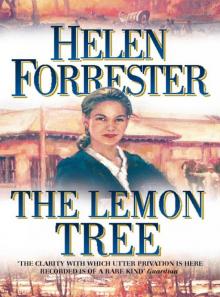 The Lemon Tree
The Lemon Tree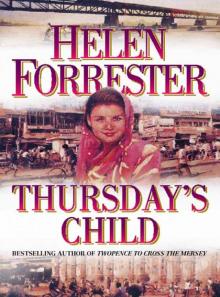 Thursday's Child
Thursday's Child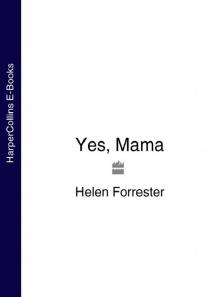 Yes, Mama
Yes, Mama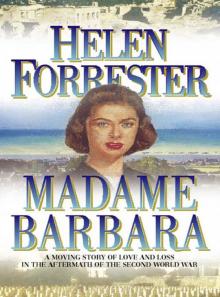 Madame Barbara
Madame Barbara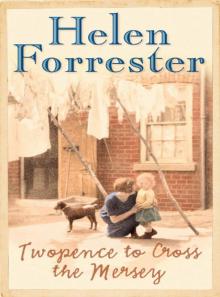 Twopence to Cross the Mersey
Twopence to Cross the Mersey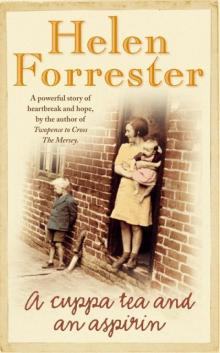 A Cuppa Tea and an Aspirin
A Cuppa Tea and an Aspirin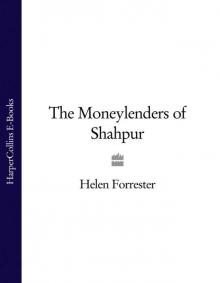 The Moneylenders of Shahpur
The Moneylenders of Shahpur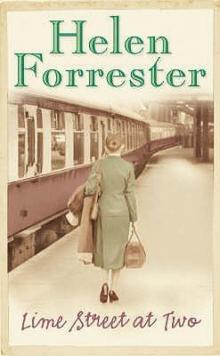 Lime Street at Two
Lime Street at Two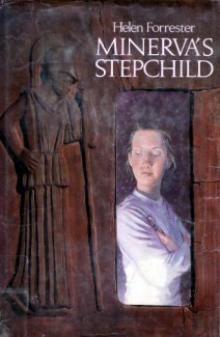 Minerva's Stepchild
Minerva's Stepchild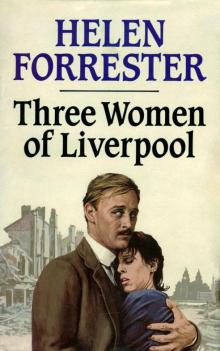 Three Women of Liverpool
Three Women of Liverpool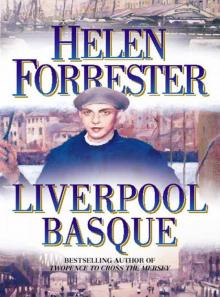 The Liverpool Basque
The Liverpool Basque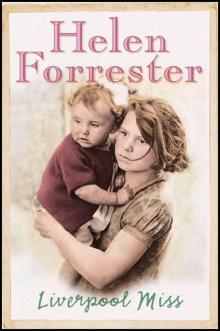 Liverpool Miss
Liverpool Miss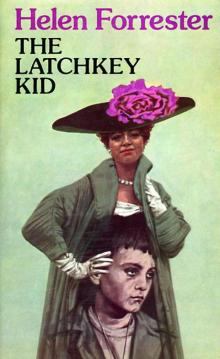 The Latchkey Kid
The Latchkey Kid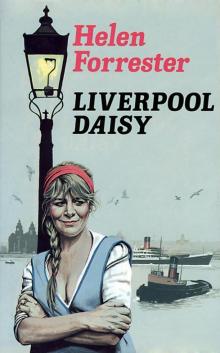 Liverpool Daisy
Liverpool Daisy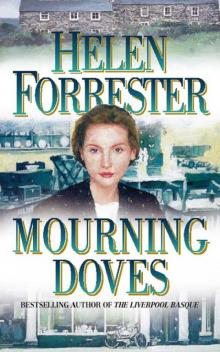 Mourning Doves
Mourning Doves